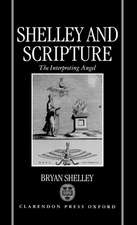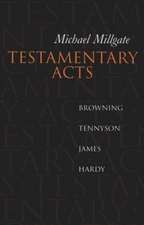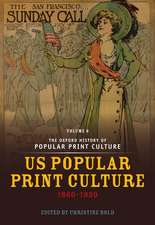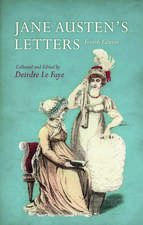Moby-Dick and Melville’s Anti-Slavery Allegory: American Literature Readings in the 21st Century
Autor Brian R. Pellar Cuvânt înainte de J. Hillis Milleren Limba Engleză Hardback – 29 iun 2017
This book unfurls and examines the anti-slavery allegory at the subtextual core of Herman Melville’s famed novel, Moby-Dick. Brian Pellar points to symbols and allusions in the novel such as the albinism of the famed whale, the “Ship of State” motif, Calhoun’s “cords,” the equator, Jonah, Narcissus, St. Paul, and Thomas Hobbe’s Leviathan. The work contextualizes these devices within a historical discussion of the Compromise of 1850 and subsequently strengthened Fugitive Slave Laws. Drawing on a rich variety of sources such as unpublished papers, letters, reviews, and family memorabilia, the chapters discuss the significance of these laws within Melville’s own life.
After clarifying the hidden allegory interconnecting black slaves and black whales, this book carefully sheds the layers of a hidden meaning that will be too convincing to ignore for future readings: Moby-Dick is ultimately a novel that is intimately connected with questions of race, slavery, and the state.
| Toate formatele și edițiile | Preț | Express |
|---|---|---|
| Paperback (1) | 692.88 lei 6-8 săpt. | |
| Springer International Publishing – aug 2018 | 692.88 lei 6-8 săpt. | |
| Hardback (1) | 698.15 lei 6-8 săpt. | |
| Springer International Publishing – 29 iun 2017 | 698.15 lei 6-8 săpt. |
Din seria American Literature Readings in the 21st Century
- 9%
 Preț: 625.19 lei
Preț: 625.19 lei - 18%
 Preț: 729.06 lei
Preț: 729.06 lei - 18%
 Preț: 729.06 lei
Preț: 729.06 lei -
 Preț: 384.86 lei
Preț: 384.86 lei -
 Preț: 381.21 lei
Preț: 381.21 lei -
 Preț: 387.75 lei
Preț: 387.75 lei -
 Preț: 388.13 lei
Preț: 388.13 lei - 18%
 Preț: 783.50 lei
Preț: 783.50 lei -
 Preț: 385.08 lei
Preț: 385.08 lei -
 Preț: 388.72 lei
Preț: 388.72 lei -
 Preț: 385.08 lei
Preț: 385.08 lei -
 Preț: 388.72 lei
Preț: 388.72 lei -
 Preț: 450.33 lei
Preț: 450.33 lei -
 Preț: 389.49 lei
Preț: 389.49 lei - 18%
 Preț: 727.97 lei
Preț: 727.97 lei -
 Preț: 386.81 lei
Preț: 386.81 lei -
 Preț: 386.99 lei
Preț: 386.99 lei -
 Preț: 381.98 lei
Preț: 381.98 lei -
 Preț: 383.12 lei
Preț: 383.12 lei -
 Preț: 384.86 lei
Preț: 384.86 lei -
 Preț: 386.81 lei
Preț: 386.81 lei -
 Preț: 388.72 lei
Preț: 388.72 lei -
 Preț: 384.86 lei
Preț: 384.86 lei -
 Preț: 387.75 lei
Preț: 387.75 lei -
 Preț: 385.62 lei
Preț: 385.62 lei -
 Preț: 388.72 lei
Preț: 388.72 lei -
 Preț: 388.13 lei
Preț: 388.13 lei -
 Preț: 388.72 lei
Preț: 388.72 lei -
 Preț: 386.22 lei
Preț: 386.22 lei -
 Preț: 387.75 lei
Preț: 387.75 lei -
 Preț: 385.84 lei
Preț: 385.84 lei -
 Preț: 392.60 lei
Preț: 392.60 lei -
 Preț: 386.81 lei
Preț: 386.81 lei -
 Preț: 387.58 lei
Preț: 387.58 lei -
 Preț: 389.49 lei
Preț: 389.49 lei - 15%
 Preț: 635.65 lei
Preț: 635.65 lei -
 Preț: 388.72 lei
Preț: 388.72 lei -
 Preț: 387.58 lei
Preț: 387.58 lei -
 Preț: 384.86 lei
Preț: 384.86 lei -
 Preț: 384.86 lei
Preț: 384.86 lei -
 Preț: 384.86 lei
Preț: 384.86 lei -
 Preț: 384.86 lei
Preț: 384.86 lei -
 Preț: 387.75 lei
Preț: 387.75 lei -
 Preț: 383.71 lei
Preț: 383.71 lei -
 Preț: 384.86 lei
Preț: 384.86 lei
Preț: 698.15 lei
Preț vechi: 821.35 lei
-15% Nou
Puncte Express: 1047
Preț estimativ în valută:
133.59€ • 139.85$ • 110.54£
133.59€ • 139.85$ • 110.54£
Carte tipărită la comandă
Livrare economică 05-19 aprilie
Preluare comenzi: 021 569.72.76
Specificații
ISBN-13: 9783319522661
ISBN-10: 3319522663
Pagini: 235
Ilustrații: XVII, 234 p. 4 illus.
Dimensiuni: 148 x 210 mm
Greutate: 0.45 kg
Ediția:1st ed. 2017
Editura: Springer International Publishing
Colecția Palgrave Macmillan
Seria American Literature Readings in the 21st Century
Locul publicării:Cham, Switzerland
ISBN-10: 3319522663
Pagini: 235
Ilustrații: XVII, 234 p. 4 illus.
Dimensiuni: 148 x 210 mm
Greutate: 0.45 kg
Ediția:1st ed. 2017
Editura: Springer International Publishing
Colecția Palgrave Macmillan
Seria American Literature Readings in the 21st Century
Locul publicării:Cham, Switzerland
Cuprins
Introduction.- 2 Melville’s Motivations.- 3 The Ship of State.- 4 Hemp and Calhoun’s “Cords”.- 5 Man as Whale.- 6. “This Afric Temple of the Whale”.- 7 The Equator.-8 “Who Ain’t a Slave?”.- 9 “The Log and the Line”.- 10 St. Paul.- 11“I Do Not Baptise Thee in Name”.- Moby-Dick and “Black Blood”.- 10 Moby Dick in Service.- Epilogue.
Notă biografică
Brian Pellar has authored four papers in Sino-Platonic Papers, a scholarly monographic series. After serving four years in the US Navy, he studied art, biology, and psychology, and ultimately English. He currently lives in Boston, MA.
Textul de pe ultima copertă
This book unfurls and examines the anti-slavery allegory at the subtextual core of Herman Melville’s famed novel, Moby-Dick. Brian Pellar points to symbols and allusions in the novel such as the albinism of the famed whale, the “Ship of State” motif, Calhoun’s “cords,” the equator, Jonah, Narcissus, St. Paul, and Thomas Hobbe’s Leviathan. The work contextualizes these devices within a historical discussion of the Compromise of 1850 and subsequently strengthened Fugitive Slave Laws. Drawing on a rich variety of sources such as unpublished papers, letters, reviews, and family memorabilia, the chapters discuss the significance of these laws within Melville’s own life.
After clarifying the hidden allegory interconnecting black slaves and black whales, this book carefully sheds the layers of a hidden meaning that will be too convincing to ignore for future readings: Moby-Dick is ultimately a novel that is intimately connected with questions of race, slavery, and the state.
Caracteristici
Grapples with provocative and controversial questions of race that will refresh readers with a timely reading of a novel that has been exhaustively discussed Combines a plethora of biographical and archival research to lay out its convincing case Offers a comprehensive account of the book's literary history but also scholarly history surrounding the topic of race


















